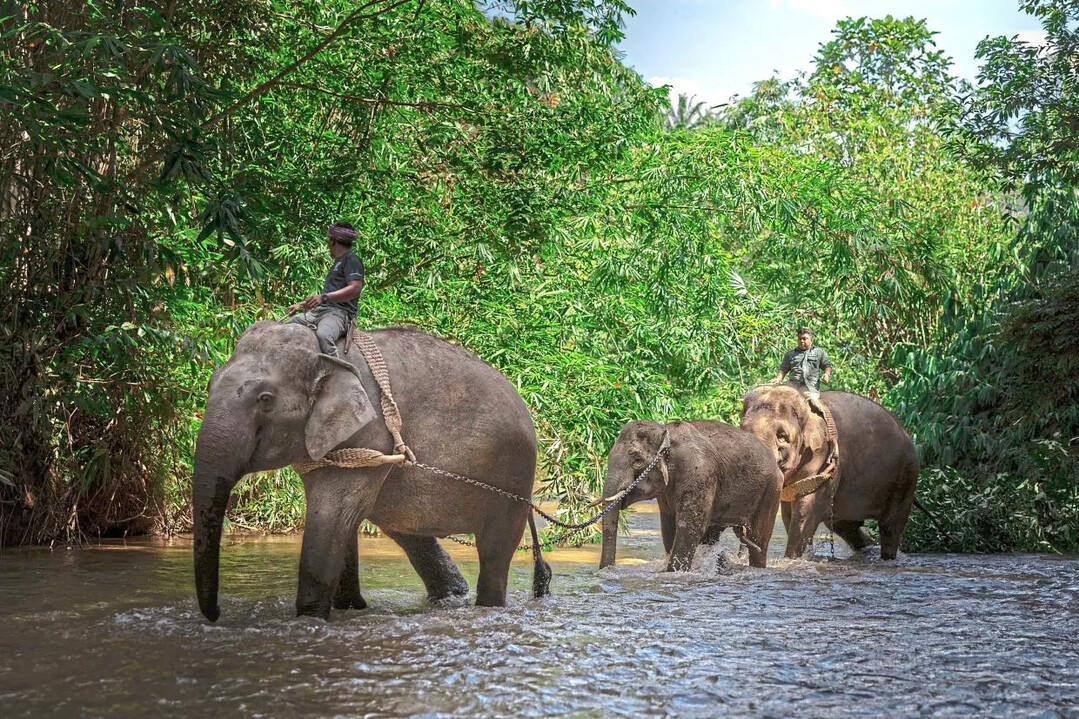
GERIK, Perak – The serene landscapes of Perak, Malaysia, particularly in districts like Gerik and Sungai Siput, are increasingly punctuated by the imposing presence of elephant herds, transforming encounters with these majestic creatures from rare sightings to a disconcerting regularity. This surge in elephant activity has prompted the Perak Wildlife and National Parks Department (Perhilitan) to escalate costly relocation efforts, as complaints of disturbance and property damage mount.
Residents and road users alike are finding their daily lives disrupted by these large mammals, which, unlike docile livestock, pose significant safety risks and inflict substantial financial losses on local communities. Farmers, in particular, lament the destruction of crops and property, highlighting the urgent need for sustainable solutions.
Perak Perhilitan Director Yusoff Shariff attributes the rise in elephant sightings to a confluence of factors, including a potential increase in elephant population, the animals' growing adaptation to human presence, and the ease of reporting incidents through modern technology. "Perak's extensive forest cover, connected to southern Thailand, provides a conducive habitat for elephants," Yusoff explained. "Additionally, increased public awareness, especially among younger generations, and the convenience of smartphone reporting have amplified the number of complaints."
Human encroachment on elephant habitats through land clearing for development has forced these animals to venture into plantations and settlements. Moreover, elephants exhibit a strong tendency to return to familiar areas, exacerbating the conflict.
Human Costs and Financial Burdens
Between 2019 and 2024, Perak Perhilitan recorded two fatalities and three injuries stemming from elephant encounters, underscoring the severity of the situation. The financial toll is equally significant, with an estimated RM2,343,673 in damages during this period. "In 2023 alone, we received 422 elephant-related complaints and disbursed RM150,744.52 in compensation to affected victims," Yusoff disclosed.
Perhilitan compensates victims for half of the estimated damage through the "Bantuan Kerugian Harta Benda dan Tanaman Akibat Serangan Hidupan Liar" (BKHT) scheme, funded by the federal government. For incidents involving injury or death, victims receive assistance through the "Tabung Bantuan Mangsa Serangan Binatang Buas," managed by the Welfare Department.
Intensified Relocation Efforts
In response to the escalating crisis, Perak Perhilitan has significantly increased its elephant translocation operations. From 2020 to 2023, the department relocated 41 elephants. In 2024 alone, this number surged to 32, with 16 animals relocated from Kampung Bandariang, Gerik, highlighting the scale of the problem.
"Typically, our first response is to drive the elephants away," Yusoff said. "However, repeated intrusions necessitate capture and relocation." The department often captures a single elephant from a herd, which usually prompts the others to disperse. However, the persistent presence of elephants in Kampung Bandariang, likely drawn by the abundance of dokong fruit, required more intensive intervention.
Relocating elephants is a complex and costly endeavor, involving substantial manpower and logistical challenges. "Each operation requires approximately 30 personnel," Yusoff noted. "The cost of tranquilizer drugs, which are imported, is high. In remote areas, we must construct access routes and loading bays using heavy machinery. We also utilize trained decoy elephants from the National Elephant Conservation Centre in Kuala Gandah, Pahang, which adds to the logistical complexity."
Elephant Biology and Behavior
Asian elephants, which can weigh up to 5,000kg and stand three meters tall, consume 6% to 10% of their body weight daily. Their diet consists of leaves, shoots, and palm hearts, which often leads them to raid oil palm plantations. They also have a taste for coconuts and sugarcane. Wild elephants can live up to 65 years, reaching sexual maturity at eight to nine years old, with a gestation period of 22 months.
Elephants live in matriarchal herds, with mature males leading solitary lives. They are most active from evening to morning, covering ranges of up to 60 square kilometers. "Elephants that are accustomed to human presence behave differently," Yusoff explained. "They learn from experience, adapting to both positive and negative interactions."
Mitigation and Public Safety
Yusoff emphasizes the importance of public awareness and responsible behavior when encountering elephants. "When you see an elephant on the road, remain still inside your vehicle and avoid honking," he advised. "Loud noises can provoke them."
Despite the challenges, Yusoff believes that Malaysia's elephant-human conflict remains relatively manageable compared to other countries. "In Thailand, elephant attacks result in 20 to 30 deaths annually," he said. "In Peninsular Malaysia, the situation is still under control."
The Perak Perhilitan continues to implement measures to mitigate conflicts, including enhanced monitoring, community outreach, and the development of long-term strategies for coexistence. With elephants fully protected under the Wildlife Conservation Act 2010, the department remains committed to balancing wildlife conservation with the safety and well-being of local communities.
[Copyright (c) Global Economic Times. All Rights Reserved.]





























